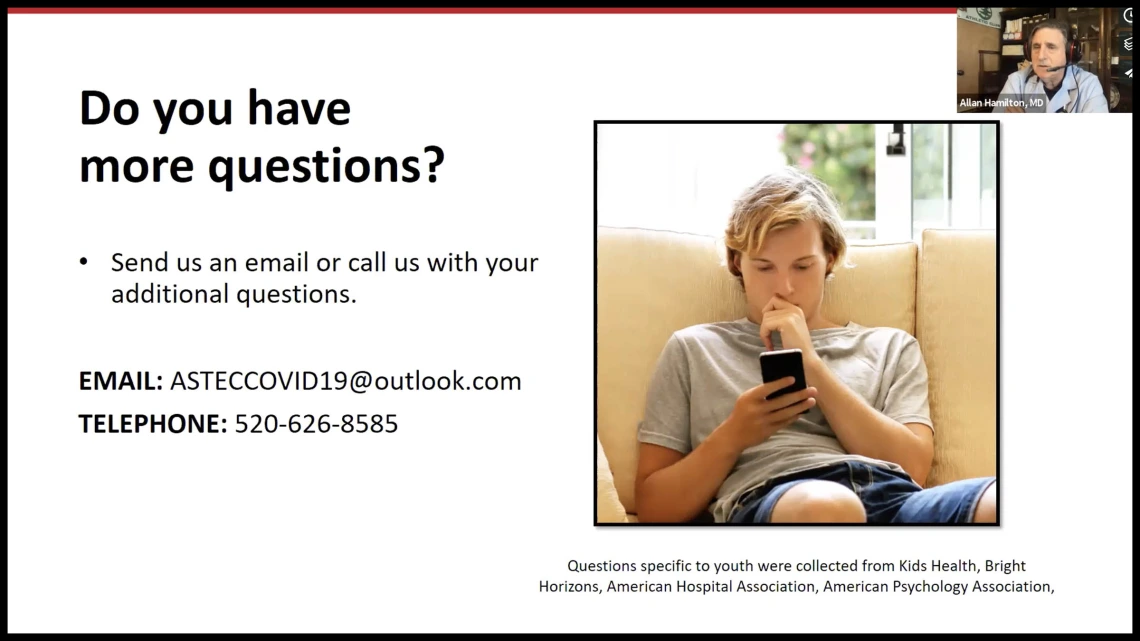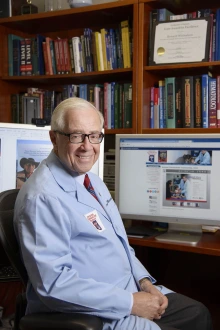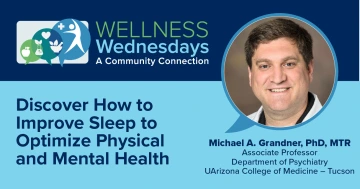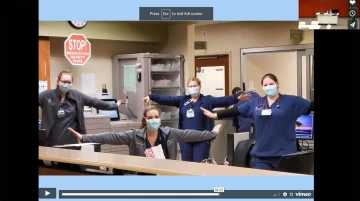Health Sciences Virtual Events Promote Health Literacy
In response to the pandemic, Health Sciences divisions are sharing tips, tools and resources for the public to better understand health decisions.

Health Sciences webinars and virtual meetings have engaged the public during the pandemic, with a focus on empowering people to understand and improve their health.
The COVID-19 pandemic has prompted a new focus on staying healthy, from prevention to education, and several teams at the University of Arizona Health Sciences are taking the opportunity to offer health literacy events for the public. They are hoping to empower and engage people during a health crisis — even amid social distancing.
The concept of health literacy is a measure of how well you can use available information to make the best health decisions. For example, understanding how the virus that causes COVID-19 can spread, or why you must complete a course of antibiotics even after you begin to feel better.
Some Health Sciences teams have launched completely new virtual events, while others are pivoting from in-person lectures to webinars that reach people in their homes. The efforts are numerous, but a few examples help illustrate their breadth and reach.
People’s Grand Rounds: Medical education for everyone
The Arizona Telemedicine Program and the Southwest Telehealth Resource Center have decades of experience training medical students and professionals to provide telemedicine to patients. Director Ronald Weinstein, MD, says the mission also includes community outreach, which has most recently been expressed in a newly launched webinar series called the People’s Grand Rounds. “It’s specifically for the people, not the medical profession,” Dr. Weinstein said.

Ronald Weinstein, MD, is the director of the Arizona Telemedicine Program, which has ample experience reaching people remotely.
“I became acutely aware of the fact that, in general, health care literacy in the United States could be much better,” Dr. Weinstein explained. “We’re very interested in community outreach, and focusing on the topics that would be of interest to the community.”
The People’s Grand Rounds debuted with two webinars: One covered how to interpret COVID-19 antibody test results, and the other was an overview of convalescent plasma to treat acute COVID-19 infections. Dr. Weinstein says the webinars accomplished their goal, with an increasing number of non-health care professionals joining the events.
Understanding Coronavirus: Webinars for children and teens
The Arizona Simulation Technology & Education Center (ASTEC) has partnered with the Arizona Telemedicine Program to create and host a webinar series to educate children, preteens and teenagers about COVID-19. Organizers have reached out to hundreds of K-12 students, and presented a webinar for a Head Start class consisting of nearly two dozen 4- and 5-year-olds.

The Arizona Simulation Technology & Education Center is bringing age-appropriate COVID-19 information to many K-12 students in their homes this summer. (Click to enlarge)
The weekly, live webinars are hosted by ASTEC Executive Director Allan Hamilton, MD, and Deana Smith, RN, healthcare simulation educator. The series was so successful in reaching students from Arizona and other countries that it was extended from June into August. Organizers put together webinars for the Arizona School for the Deaf and Blind, and will offer sign language interpretation and closed captioning. They’re also looking into Spanish translation for future webinars.
“These webinars are designed for children and the lay public, so they are easy to understand and accessible for everyone,” Partica said. “Though the content is directed toward younger age groups, we hope it is also instructional for parents, teachers and anyone else who interacts with children, so they can better speak to the crisis in an age-appropriate manner.”
Wellness Wednesdays: Offering tools for action
Wellness Wednesdays is a newly launched weekly webinar series that shares health and wellness tips at lunchtime. Topics have included healthy eating at home, staying connected with family during times of physical distancing, and breathing techniques.

Health Sciences employees, along with members of the general public, can spend their lunch breaks on Wednesdays learning tips to improve their well-being during the pandemic.
Medina says promoting health literacy is an important part of her team’s mission.
“Strong health literacy enables people to develop the skills and confidence to make informed decisions about their health and the health of their families, to be active partners in their care, to effectively navigate health care systems, and to advocate effectively to their political leaders and policy-makers,” Medina said. “You cannot control that which you do not understand.”
Arthritis Center: Expanding reach through webinars
Other virtual events target a more specific slice of the general population. For more than two decades, the University of Arizona Arthritis Center has presented a monthly lecture series during the academic year titled “Living Healthy With Arthritis,” as well as twice-monthly classes as part of the “Living Healthy With Arthritis Canyon Ranch Active Series.”

A recent Arthritis Center webinar focused on resiliency, and included a music video featuring several medical professionals lip synching to the song “You’ve Got a Friend.”
In response to the COVID-19 pandemic, the center moved these events to a virtual format — which came with a silver lining for organizers. “Some members of our target audience might have increased access to these events,” said Tracy Shake, director of outreach and education for the Arthritis Center. “Those with mobility limitations, who typically must navigate tasks such as driving, parking, and maneuvering to the venue and the appropriate seating, now can simply stream events from home.”
Shake and Arthritis Center marketing specialist Greg Gilles say that promoting health literacy is an important component of these events.
“Health literacy influences a large number of important health-related behaviors one makes on a daily basis, from dietary choices to medication adherence,” Shake said. “The health literacy of one individual can also significantly impact the health of others, such as instances in which one individual makes health decisions on behalf of a family member.”
The Arthritis Center’s classes and lectures have concluded for the academic year, but are scheduled to resume in September. Organizers plan to continue with the livestream format — though there is talk of including a small in-person audience as well if conditions allow.

